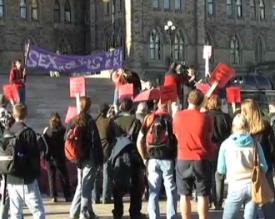Folks charged with keeping a common bawdyhouse can now face an additional charge: being a member of a criminal gang.
As part of its plan to crack down on organized crime, the federal government put through several regulatory changes to the Criminal Code in the middle of July. Justice Minister Rob Nicholson announced the changes on Wednesday.
“The fact that an offence is committed by a criminal organization makes it a serious crime,” Nicholson stated in a press release. “These regulations will help ensure that police and prosecutors can make full use of the tools in the Criminal Code that are specifically targeted at tackling organized crime.”
The definition of a “criminal organization” is three or more people engaged in committing “serious offences” for profit. Thanks to the cabinet fiat, “serious offences” includes close to a dozen new crimes. While most of the regulatory changes announced to the Criminal Code affect gambling, betting or drug trafficking, the government also included keeping a common bawdyhouse (subsection 210(1) and paragraph 210(2)(c)).
NDP MP Libby Davies says it’s “outrageous” that the Conservative government has quietly enacted new organized crime regulations — which include making bawdyhouse offences a “serious crime” — while Parliament is on summer break.
“It’s outrageous that they do it in the dead of summer,” Davies says. “This is such a characteristic now of the Conservative government — they bring about manoeuvres and policy changes and announce them when they think no one’s paying attention.
“To have changes to the Criminal Code that are regulatory and to do it outside of Parliament, when there’s less chance of scrutiny because everybody’s away, is terrible. It means that we can’t hold the government to account because everyone’s away, because Parliament’s not sitting.”
Christine Bruckert, a professor of criminology at the University of Ottawa who has studied sex work, says the change in regulation could affect massage parlours, brothels, dungeons, bathhouses — even swingers’ clubs.
“It could have a significant and wide-ranging impact,” she says.
Bruckert calls the changes “a slippage in the discourse around trafficking,” where anxiety about women being trapped by international pimps is now being applied to unrelated situations.
“If you understand bawdyhouses as a place where people work, it has nothing to do with a serious crime,” says Bruckert. “That’s why it’s not defined as a serious offence in the criminal code.”
Valerie Scott of Sex Professionals of Canada (SPOC) agrees, comparing it to the days of Progressive Conservative Prime Minister Brian Mulroney.
“How they’re going to sell this to people is human trafficking,” says Scott. “When Mulroney made [sex work] an enterprise crime, they made it about the war on drugs. They slid it in there with 26 other offences.”
But at least when Mulroney notched up the prohibitions on sex work, he did it in the house of commons, says Scott, and not behind closed doors.
Bruckert points out that those who work in bawdyhouses are usually better off than those who do sex work on the street or independently.
“If you’re talking about a labour site, it’s the safest place to provide sex work,” says Bruckert. “You’re providing a disincentive to operate this kind of place.”
Tuulia Law of SPOC agrees.
“People seem to have this preconceived idea of brothels as dangerous or bad, but really it’s just a workplace,” says Law.
Police have repeatedly used Canada’s bawdyhouse law to raid bathhouses in Canada. A citywide crackdown of bathhouses in 1981 became a rallying point for gay activism in Toronto. More recent raids include Toronto’s Pussy Palace in 2000, Calgary’s Goliath’s in 2002 and Hamilton’s Warehouse Spa in 2004.
As to the specific bawdyhouse provisions, Davies feels this is little more than the government maintaining the illusion that it is cracking down on organized crime when she feels the existing laws are tough enough.
“If their intent is to put a tighter grip around bawdyhouses, then that will affect sex workers, and it will affect their safety and their rights. We should be very concerned about what they’re up to here.”
Liberal public safety critic Mark Holland has also raised red flags. “When you do legislation as a political weapon, when you do legislation in the middle of the night with no consultation, no utilization of Parliamentary committee, and you just whip it together to try to change the channel politically, it has all kinds of unintended consequences,” he says.
Justice officials state in the release that making these provisions serious offences will make it easier for police and prosecutors to take full advantage of specific Criminal Code offences dealing with organized crime.
Davies begs to differ.
“We shouldn’t be under any illusions that they’re in some way protecting people because the story is, is on their crime agenda, their laws are actually very harmful — particularly when it comes to people who are in vulnerable positions, such as sex workers or people who use drugs.”
Law also worries that the Conservatives’ move could affect SPOC’s charter challenge to the bawdyhouse law and other sex laws. A decision in that case is expected by Sept 30.



 Why you can trust Xtra
Why you can trust Xtra


